15 Awesome Superfoods for Dogs (Vet Approved)
Updated on

We all know that some foods are better for us than others, but did you know that some are downright super? Superfoods are those that offer maximum nutrition in minimal amounts, and there are more out there than you might think. While the benefits of superfoods are more well-known in humans, our dogs can also gain valuable nutrients from eating them. Here are 15 awesome superfoods your dog may enjoy.
The 15 Awesome Superfoods for Dogs
1. Carrots
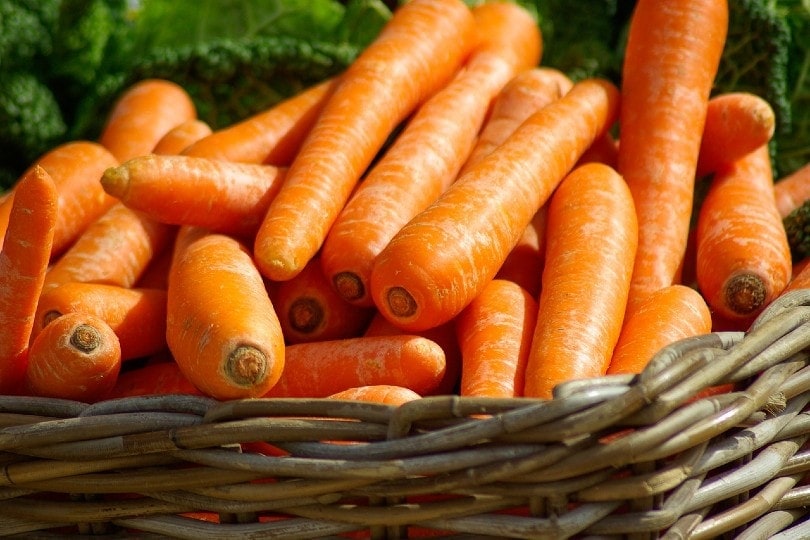
| Food group: | Vegetable |
| Key nutrients: | Beta carotene, fiber |
Naturally, orange fruits and vegetables like carrots are full of beta-carotene, a nutrient that supports eye and immune health. It’s also beneficial for your dog’s skin and coat. Most dogs love crunching on carrots, and chewing the veggies is helpful for their teeth and gums. Carrots are also high in fiber, which can help keep your dog’s digestion working smoothly. Feed the veggies raw, cut them into bite-size chunks, or as a treat or food topper. You could also offer them complete if frozen, boiled, or steamed without seasoning.
2. Blueberries
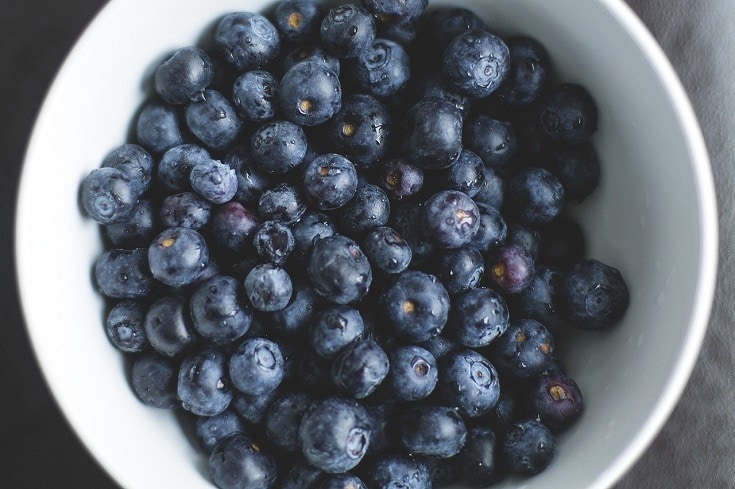
| Food group: | Fruit |
| Key nutrients: | Antioxidants, fiber, anthocyanins |
These little blueberries are one of the most powerful superfoods out there. They’re jammed with antioxidants that reduce damage to cells over time. Blueberries get their color from anthocyanins, which are tinted compounds that have anti-inflammatory and antioxidant abilities.
They help protect your dog’s brain cells, fight weight gain, and possibly even reduce the risk of certain cancers. Blueberries are also high in fiber and rich in vitamins and minerals. They can be fed fresh or frozen, although you may need to crush them to allow small dogs to eat blueberries safely.
3. Salmon
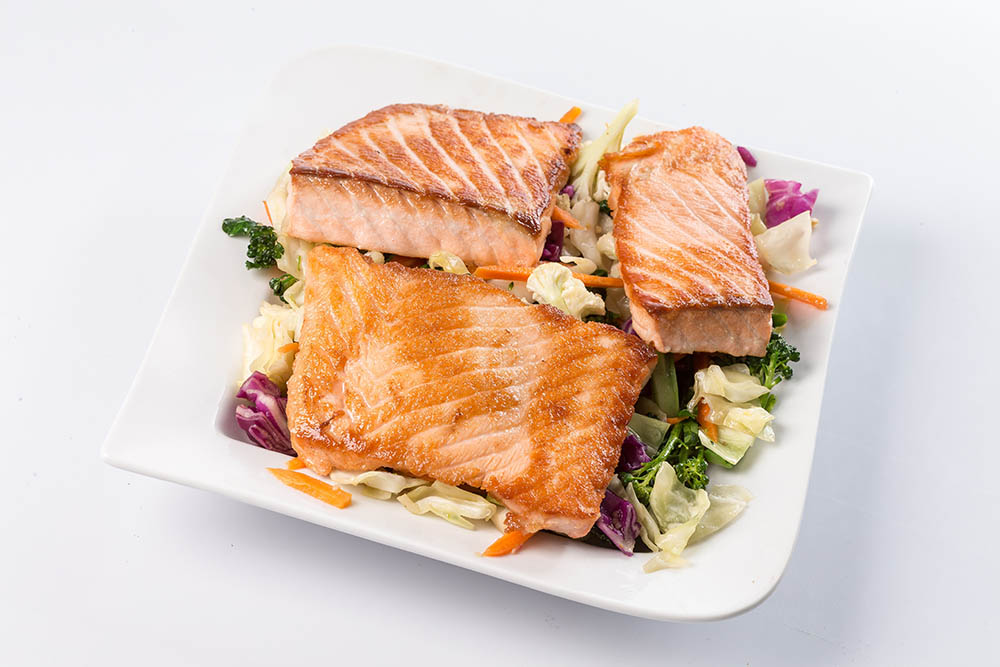
| Food group: | Fish |
| Key nutrients: | Omega-3 fatty acids |
Salmon is a common protein source for commercial dog foods. It is packed with lean protein and serves as a source of Omega-3 fatty acids. Healthy fats are beneficial to your dog’s skin and coat. They also support joint health and act as an immune booster. Salmon should never be offered raw, and avoid adding too much additional fat during cooking. Don’t overdo the fatty acids by feeding salmon with other fish oil supplements. Consult your vet if you aren’t sure how much is too much.
4. Spinach
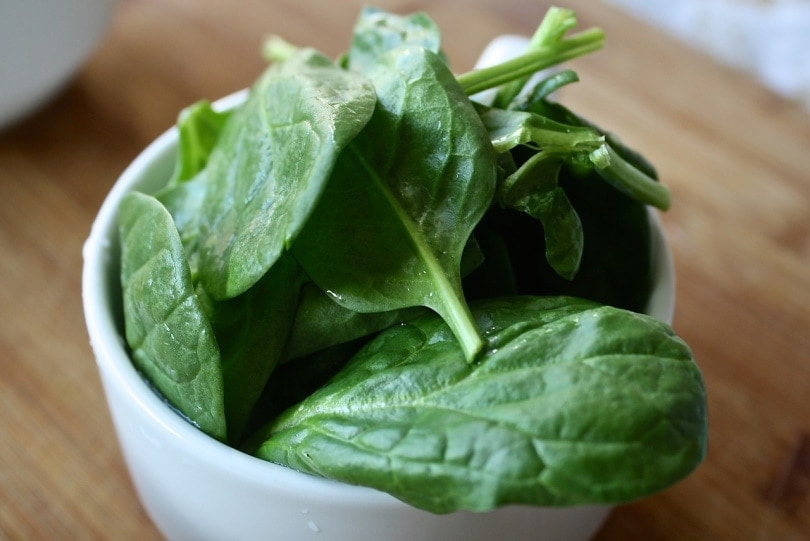
| Food group: | Vegetable |
| Key nutrients: | Antioxidants, calcium, iron, Vitamin K, fiber |
Spinach is one of several dark, leafy green superfoods for dogs (and people). It contains compounds called phytonutrients, which are antioxidants with anti-inflammatory properties.
Scientists performed a study to determine whether eating certain vegetables reduced the risk of developing cancer in dogs. They found that eating dark greens, like spinach, may reduce that risk by 50%! Spinach is also super nutritious, with high levels of calcium, iron, fiber, potassium, and several vitamins.
You can serve your dog spinach raw (wash it thoroughly first) by chopping and mixing it with their food. If they don’t like it raw, try steaming it first.
5. Pumpkin
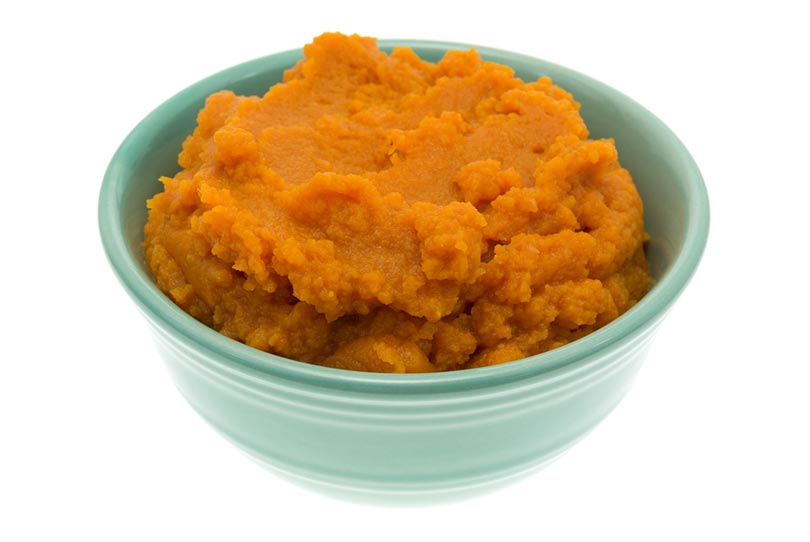
| Food group: | Vegetable |
| Key nutrients: | Beta carotene, antioxidants, fiber |
Like carrots, pumpkin is a good source of beta-carotene. The same study we mentioned previously also found that eating orange-yellow vegetables reduced dogs’ risk of developing cancer.
Pumpkins contain antioxidants, calcium, iron, and several essential vitamins. However, they might be best known for their use as a fiber source. Vets often recommend pumpkin to help firm loose stools or relieve constipation.
Cooked pumpkin or plain (not pumpkin pie mix) canned pumpkin are both okay to feed your dog. You might want to double-check how much to serve with your vet since eating too much fiber could cause diarrhea.
6. Quinoa

| Food group: | Grain/vegetable |
| Key nutrients: | Protein, antioxidants, fiber, iron, magnesium |
Quinoa is a seed (often called a grain) that is popping up more and more as an ingredient in commercial dog food, usually as part of an “ancient grains” recipe. The superfood is one of the few non-animal sources of protein with nine amino acids.
Quinoa is an antioxidant and a good source of fiber and minerals like iron and magnesium. Cook it like rice, and avoid adding seasonings, butter, or oil. Try mixing some into your dog’s regular diet.
7. Chia Seeds
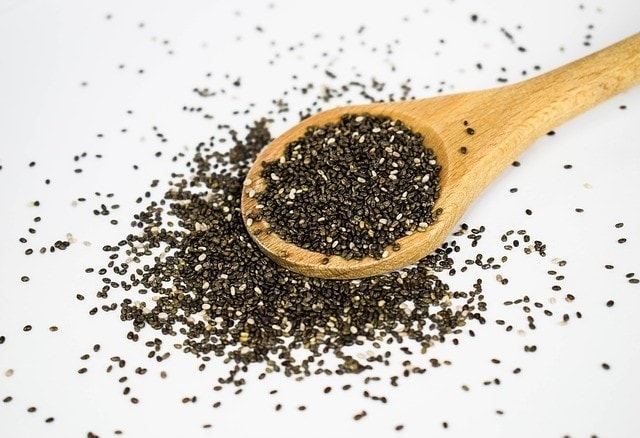
| Food group: | Grain |
| Key nutrients: | Antioxidants, calcium, fiber, protein, B vitamins |
Chia seeds may be tiny, but they are a true superfood, bursting with nutritional benefits for your dog. They contain protein, fiber, antioxidants, B vitamins, and even fatty acids! Eating chia seeds can help support your dog’s digestive, skin, coat, and joint health while providing overall immune-boosting properties.
Because they absorb liquids well, chia seeds can help your dog feel full longer if they’re trying to lose weight. Chia seeds can be sprinkled directly onto your dog’s food, although it is recommended to soak them in water for at least 30 minutes first.
8. Yogurt
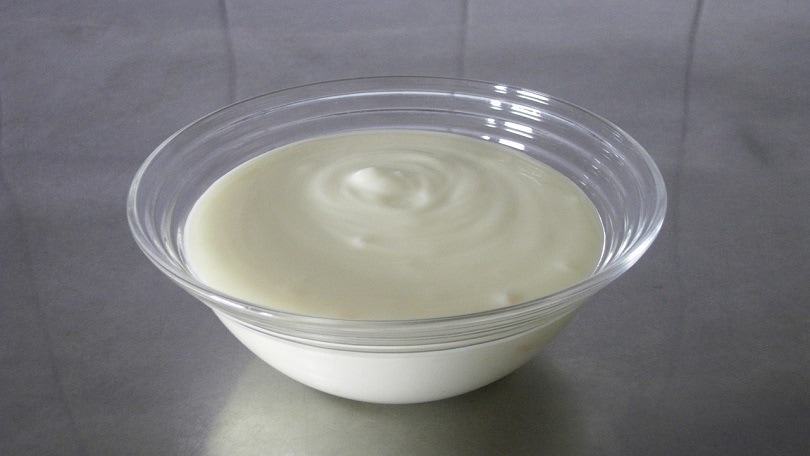
| Food group: | Dairy |
| Key nutrients: | Probiotics, protein |
Yogurt, especially Greek yogurt, is a high-protein food. However, it is probably best known as a reliable source of probiotics that play a role in keeping the digestive system and gut healthy. Probiotics are often recommended for dogs suffering from stomach or intestinal issues.
Use plain, unsweetened yogurt varieties to avoid extra sugar and additives. However, some dogs have trouble digesting dairy, so check with your vet before feeding the superfood to your pup. They may suggest starting with a small amount to see how your dog handles it.
9. Watermelon

| Food group: | Fruit |
| Key nutrients: | Antioxidants, fiber, potassium, water |
Watermelon is one of the most nutritious melons and is packed with antioxidants, fiber, and several vitamins and minerals. It contains a specific antioxidant called lycopene, which may help reduce the risk of cancer.
Watermelon (unsurprisingly) contains a high volume of water, which can help keep your pup hydrated in hot weather. Feed your dog the fruit with no rind or seeds, and stick to a small amount at a time due to the fiber content.
10. Ginger
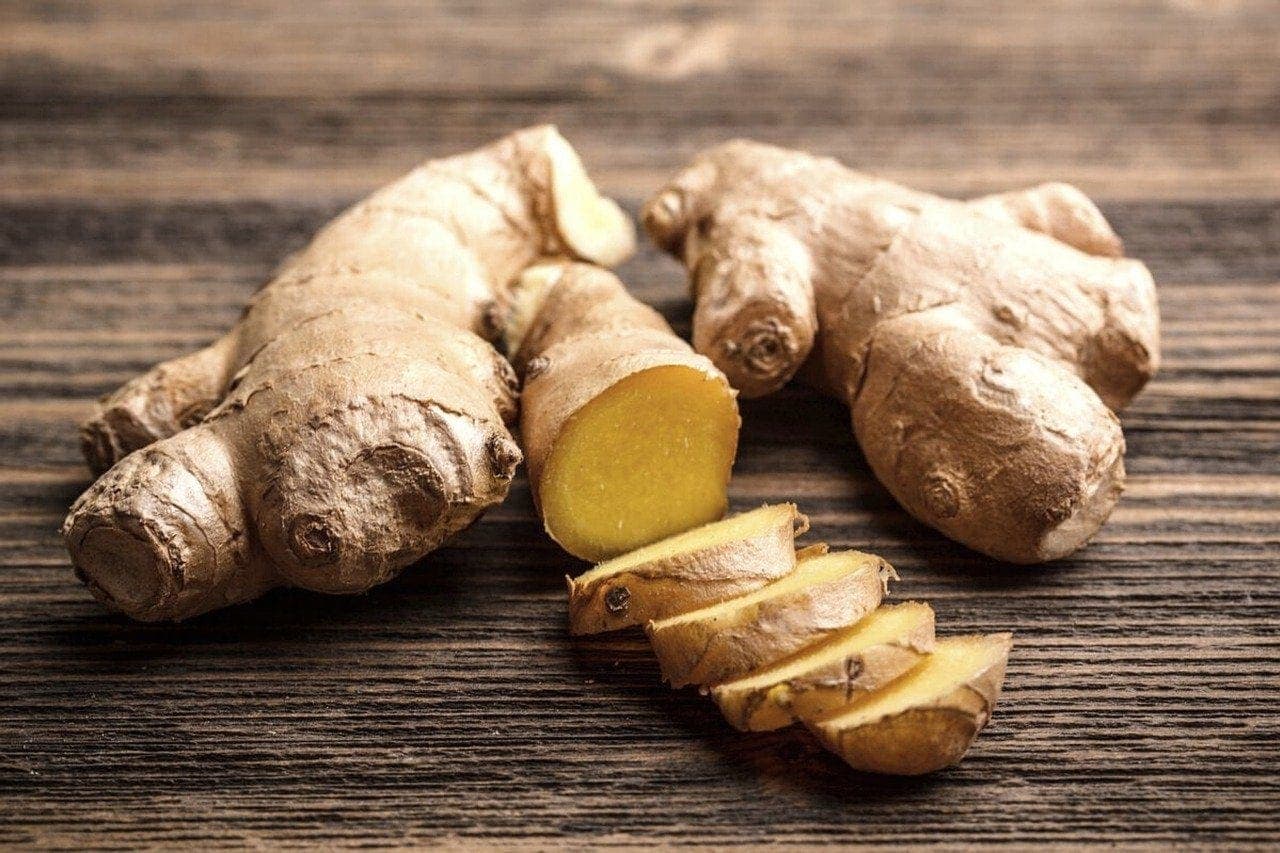
| Food group: | Vegetable |
| Key nutrients: | Anti-inflammatory |
Considered a vegetable because it’s the root of a plant, ginger has anti-inflammatory properties. It’s commonly used to soothe upset stomachs and can also help ease inflammation from arthritis. Ginger may impact blood pressure and blood sugar, so check with your vet before feeding it to your dog. Once you get the okay, ginger can be offered as tea or raw, peeled, and minced.
11. Apples

| Food group: | Fruit |
| Key nutrients: | Antioxidants, fiber |
Like gnawing on carrots, chewing apple slices can benefit your dog’s dental health by cleaning its teeth and strengthening the gums. Apples are also an excellent source of fiber and antioxidants.
If your dog can’t or won’t chew raw apples, try steaming them or pureeing cooked apples into sauce. Be careful to remove all the apple seeds before feeding the fruit. Not only are apple seeds a potential choking hazard, but they also contain a toxic compound that can make your dog sick.
12. Eggs
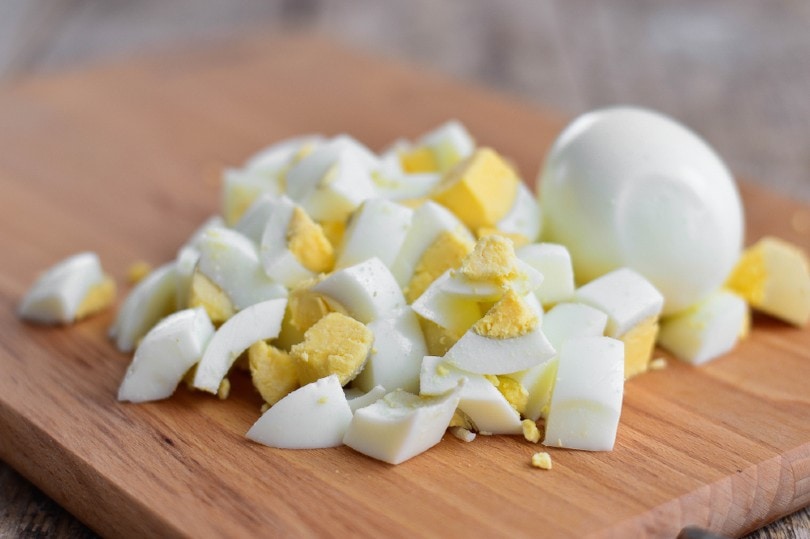
| Food group: | Protein |
| Key nutrients: | Protein, amino acids, fatty acids |
Eggs are a superfood for dogs and humans and are full of highly digestible protein, amino acids, fatty acids, and other nutrients. They are a healthy way to add a quick calorie and protein jolt to your dog’s daily meals.
Eggs can be especially beneficial for your dog’s skin and coat health. Don’t serve raw eggs since they could be a source of dangerous bacteria that could make your pup sick or endanger human health. Try serving boiled or scrambled eggs without seasoning.
13. Coconut Oil

| Food group: | Fats/Oils |
| Key nutrients: | Fatty acids |
Coconut oil is a good source of healthy fats and fatty acids, making it a popular superfood for dogs and humans. In humans, the oil is beneficial for skin and hair and helps improve memory and brain function.
Your dog’s coat may also appreciate the addition of coconut oil to its diet. Because it is calorie-dense, you’ll need to control portions carefully to avoid weight gain. Check with your vet before feeding coconut oil since it could also increase cholesterol.
14. Turmeric

| Food group: | Vegetable |
| Key nutrients: | Antioxidant, anti-inflammatory |
Turmeric is related to ginger and offers similar nutritional benefits. The yellow root is a trendy superfood among humans, especially revered for its anti-inflammatory properties. Curcumin is the official name for the beneficial component of turmeric.
It is an antioxidant and may also have antiviral, antibacterial, and antifungal abilities. Tumeric may be helpful for dogs with joint inflammation and also provides digestive support. Mix turmeric with healthy oil, such as coconut or olive, to make it more absorbable for your dog, and add it directly to their food.
15. Bone Broth
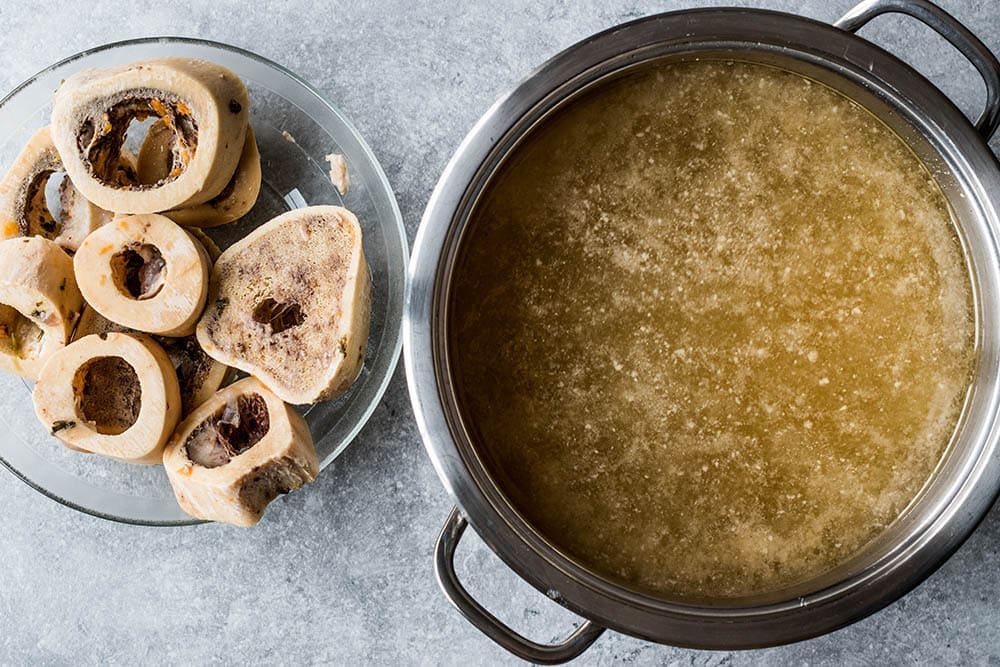
| Food group: | Meat/protein |
| Key nutrients: | Amino acids, collagen, glucosamine |
Bone broth is a concentrated source of several beneficial nutrients. It is made by simmering animal bones for at least 24 hours. You can make your own using leftover bones from your last meat dinner or purchase it pre-made.
Bone broth is high in protein and contains amino acids, collagen, and many vitamins and minerals. It is beneficial for dogs with arthritis because it is a source of glucosamine. Because it is so rich, serve only a small amount of bone broth to your dog to avoid upsetting its stomach. You can add broth to their food or allow them to drink it straight.
Conclusion
While these superfoods provide nutritional benefits to your dog, they should only be used as a supplement to your dog’s regular diet. Commercial dog food must all meet basic nutritional standards, ensuring it is balanced and complete.
If you want to serve superfoods to your dog, check with your vet to ensure it is safe and for guidance on calculating the correct amounts to feed. Play it safe and run any potential new foods by your vet first.
See Also:
- 10 Benefits of Eye Supplements for Dogs – Protecting Their Vision
- Are Human Vitamins Dangerous for Dogs? Vet Reviewed Facts & FAQ
Featured Image Credit: Bhitakbongse Lee, Shutterstock











